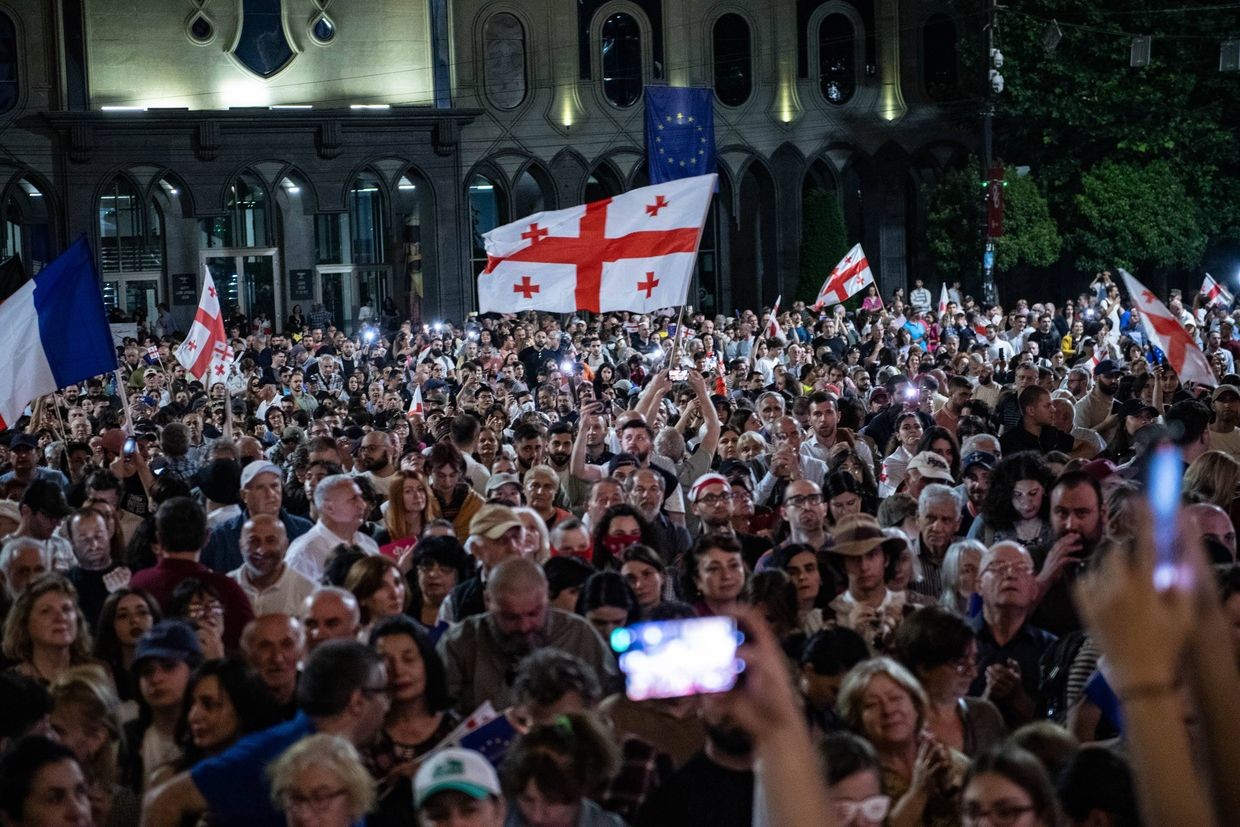
A new poll in Georgia has suggested that a large portion of Georgians believe the country is heading in the wrong direction. An even greater number considered the country to be in a political crisis, and a vast majority supported the demand to release those detained during the protests, according to the poll.
The survey was conducted in June by the Institute of Social Studies and Analysis, a local think tank, for the Civil Society Foundation — formerly the Georgian branch of the Open Society Foundation.
In it, 58% of respondents said the country was heading in the wrong direction. This view was most strongly shared by Tbilisi residents (71%) and supporters of the pro-European opposition (88%). In contrast, 85% of Georgian Dream voters said the country was moving in the right direction.
A significantly larger majority of respondents — 72% — said there was a political crisis in the country. The figure marks a 10% drop from the same survey conducted in January. Half of Georgian Dream supporters shared the idea.
Barring those who support Georgian Dream, a majority of respondents across all subcategories — those in Tbilisi, Georgians outside of the capital, and pro-Western opposition votes — held Georgian Dream responsible for the crisis. The latter group mostly blamed the United National Movement (UNM) and other opposition parties.
After removing those who did not express a preference, 35.8% of respondents expressed support for the ruling Georgian Dream party. This was followed by the Coalition for Change at 18%, Unity — United National Movement at 16.6%, Gakharia for Georgia at 10%, and Strong Georgia at 9.5%.
The ruling party’s popularity is significantly lower in Tbilisi (23%) compared to the regions (41.4%).
Majority of Georgians support new elections
According to the survey, more supported (43%) than opposed (35%) the anti-government protests that have been ongoing since November. Support was significantly higher in Tbilisi, where 62% backed the rallies. In the regions, 40% did not support the demonstrations, while 35% did.
Opinion on the protest demands were mixed.
One of the main demands — the call for new parliamentary elections — was supported by the majority of those polled nationwide (55%) and by 63% in Tbilisi. In the regions, half of respondents (51%) supported new elections, while 38% were opposed. Responses largely reflected the divide between supporters of the ruling party and the opposition.
However, there was much broader consensus when it came to the release of those detained during the protests — many of whom are young people. This demand was supported by 73% of respondents overall, including 79% in Tbilisi and 70% in the regions. Even among Georgian Dream supporters, despite half opposing the idea, 40% expressed support for it.
https://oc-media.org/georgian-protester-sentenced-to-five-years-in-prison-against-backdrop-of-protests/
The researchers also asked people about the case of Netgazeti and Batumelebi founder Mzia Amaghlobeli, who faces up to seven years in prison for slapping a police officer. A majority of respondents (59%) said the charges against her were unfair — including 70% in Tbilisi, 54% in the regions, and 22% of Georgian Dream supporters. Among the ruling party’s voters, 23% either had no answer or refused to respond.
Georgians remain unsure about FARA
Respondents were also asked about the October 2025 local elections, which numerous opposition parties have announced they will boycott.
Only 20% of supporters of pro-Western opposition parties supported the unconditional participation of opposition parties in the 2025 local elections. Of voters in the same category, 43% said the opposition should boycott the elections, while 26% said opposition parties should participate in the local vote only if early parliamentary elections were held beforehand or simultaneously.
In contrast, an absolute majority of Georgian Dream and its satellite party People’s Power voters — 70% — supported unconditional opposition participation in the municipal elections.
Respondents were also asked about one of the restrictive laws recently passed by Georgian Dream, specifically the Foreign Agents Registration Act (FARA). The survey found that 45% of respondents could not assess the law at all. An additional 36% said the law was aimed at weakening independent media and civil society, while 19% believed it would protect the country from foreign interference. Among opposition supporters, 31% had no answer or refused to express their opinion on the law; the number was 46% among Georgian Dream supporters.
https://oc-media.org/georgian-authorities-demand-extensive-data-from-two-more-civil-society-groups/
According to the survey, among the most pressing issues facing the public were high prices, the occupation of Georgian territories, emigration, low pensions, drug-related problems, poverty, and unemployment. These were followed by concerns over the erosion of democracy and human rights, lack of judicial independence, and worsening relations with the West.
Over the past 2.5 years, the majority in nearly all categories reported that their household’s economic situation had remained unchanged. However, in almost every group, the number of those who said their household’s economic condition had worsened exceeded those who reported an improvement.
The survey was conducted between 17 and 29 June, using face-to-face interviews with 2,000 respondents aged 18 and above.











